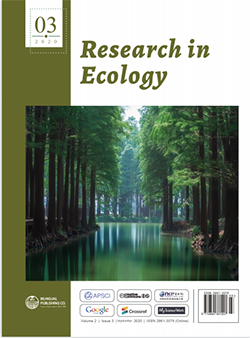
Does Environmental Laws and Policies Work? A Review Of Ghana’s Case
DOI:
https://doi.org/10.30564/re.v2i3.2216Abstract
Enforcing environmental laws and policies has been one of the pressing agenda globally. Despite the mandate given to the Environmental Protection Agency (EPA) by the Act 490, there are still numerous environmental issues unaddressed in Ghana. This paper is geared towards unravelling and identifying the current additions that have been made to existing literature on environmental laws and policies in Ghana. This paper made a wide-ranging general literature review to outline significant contributions concerning environmental laws and policies. Numerous environmental laws and policies were identified but have been fragmented and are not codified in a particular document. It is evident from the review of literature existing that there are still areas for advanced research on the topic of environmental laws and policies placing more emphasis on institution concerned with environmental issues at global level. The study recommended the need for capacity building for environmental personnel and data due to the numerous technological advancement to better assist the implementation and enforcement of environmental laws in Ghana.
Keywords:
Environmental laws; Environmental policies; Environmental Protection Agency; Law enforcement; Act 490; GhanaReferences
[1] Hunter, L. M., Strife, S., Twine, W. Environmental perceptions of rural south african residents: The complex nature of environmental concern. Society and Natural Resources, 2010, 23(6): 525-541. https://doi.org/10.1080/08941920903357782
[2] Guruswamy, L. International Environmental Law in a nutshell, Thomson/West, USA, Third Edition. 2007: 721.
[3] EPA, Ghana. Environmental Management Plan Procedure for Manufacturing Industries. Environmental Protection Agency, Accra, Ghana, 2004.
[4] Dunlap, R. E., Van Liere, K. D., Mertig, A. G., Jones, R. E. New Trends in Measuring Environmental Attitudes: Measuring Endorsement of the New Ecological Paradigm: A Revised NEP Scale. Journal of Social Issues, 2000, 56(3): 425-442. https://doi.org/10.1111/0022-4537.00176
[5] Yeboah K., Tutuah M. A. A. 40 Years of environmental protection in Ghana: Footprints from EPC to EPA. 2014, Daily Graphic / Ghana, Retrieved on Thursday, 2014, 12: 20. Published in features.
[6] Okley, B. L. Legislation and Implementation of International Environmental Law by African Countries: a Case Study of Ghana [University of Geogia]. In LLM theses, 2004. http://digitalcommons.law.uga.edu/cgi/viewcontent.cgi?article=1038&context=stu_llm
[7] Nukpezah, D. Corporate Environmental Governance in Ghana: Studies on Industrial Level Environmental Performance in Manufacturing and Mining. Doctoral Thesis, 2010, 177.
[8] Grubb, M., Koch, M., Thomson, K., Sullivan, F., Munson, A. The'Earth Summit'Agreements: A Guide and Assessment: An Analysis of the Rio'92 UN Conference on Environment and Development. Routledge, 2019, 9.
[9] Larsey, M. Trends in Environmental Legislation, Seminar Paper presented to Media Practioners. EPA, Ghana, 2001.
[10] Ashford, N. A., Caldart, C. C. Environmental law, policy, and economics: Reclaiming the environmental agenda. Mit Press, 2008.
[11] Darko-Mensah, A. B., Okereke, C. Can environmental performance rating programmes succeed in Africa? An evaluation of Ghana’s AKOBEN project. Management of Environmental Quality: An International Journal, 2013, 24(5): 599-618. https://doi.org/10.1108/MEQ-01-2012-0003
[12] Tuokuu, F. X. D., Gruber, J. S., Idemudia, U., Kayira, J. Challenges and opportunities of environmental policy implementation: Empirical evidence from Ghana’s gold mining sector. Resources Policy, 2018, 59(May): 435-445. https://doi.org/10.1016/j.resourpol.2018.08.014
[13] Atwood, D., Paisley-Jones, C. 2008-2012 Market Estimates. In Pesticides Industry Sales and Usage, 2017.
[14] García, S., Leiva Moreno, I. Global overview of marine fisheries. Conference on Responsible Fisheries in the Marine Ecosystem, 2003, 103-123.
[15] Ntiamoa-Baidu, Y. Issues In African Biodiversity, No. 1. Indigenous vs. Introduced Biodiversity Conservation Strategies: The Case Of Protected Area Systems In Ghana. African Biodiversity Series, 1995.
[16] Agyekwena, B. District Assemblies adopt SEA's in Medium Term Development Plans in Ghana. Daily Graphic, 6, 4.Appiah, D. O., & Osman, B. (2014). Environmental impact assessment: Insights from mining communities in Ghana. Journal of Environmental Assessment Policy and Management, 2014, 16(4): 1-20. https://doi.org/10.1142/S1464333214500318
[17] Adjarko, H., Gemadzie, J., Agyeman, K. Construction Related Environmental Construction Related Environmental Laws and Policies in Ghana : Asian Journal of Science and Technology, 2016, 7(5): 2984- 2992.
[18] Boon, E. K. Monitoring, evaluation and control of environmental policy and programmes in developing countries: Lessons from Ghana. Case Studies in Applied Human Ecology-An International Overview. VUB-Press, Brussels, 1998.
[19] Imperial, M. T. Institutional analysis and ecosystem-based management: the institutional analysis and development framework. Environmental management, 1999, 24(4): 449-465.
[20] Azapagic, A. Developing a framework for sustainable development indicators for the mining and minerals industry. Journal of Cleaner Production, 2004, 12(6): 639-662. https://doi.org/10.1016/S0959-6526(03)00075-1
[21] Mulamoottil, G. Indigenous institutions and environmental assessment: The case of Ghana. Environmental Management, 1997, 21(2): 159-171.
Downloads
How to Cite
Issue
Article Type
License
Copyright © 2020 Aboagye Emmanuel Mensah, Attobrah Justice, Owusu Nana Osei, Fletcher Henrietta

This is an open access article under the Creative Commons Attribution-NonCommercial 4.0 International (CC BY-NC 4.0) License.




 Aboagye Emmanuel Mensah
Aboagye Emmanuel Mensah





